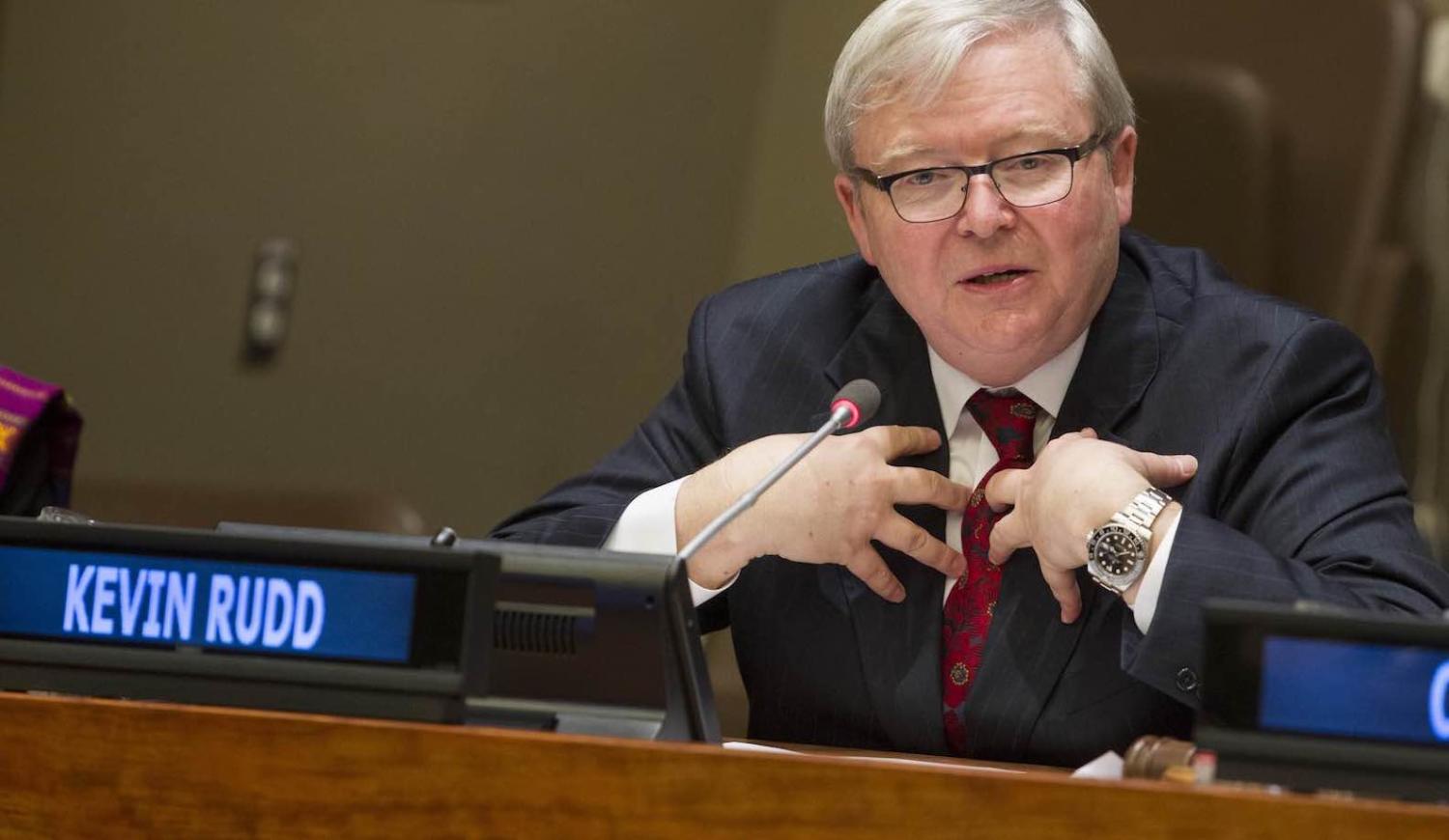At the launch of Kevin Rudd’s weighty second volume of memoirs, the Canberra press gallery was in full-on cynicism mode.
In the Holder Room in the inner sanctums of Parliament House, Angus and Robertson, the publishers, had set up a stall selling copies of the book – Kevin Rudd, The PM Years – for a generous discount. Yours truly purchased a copy.
A senior correspondent saw the transaction take place and lent over towards me with the observation: “You are not paying good money for that pile of rubbish are you? Wait till it is remaindered. It won’t be long.”
This book is understandably an attempt to justify his prime ministership. It is also an act of revenge against those who bought him down ... But there is much more to it than nastiness.
It struck me as a rather extraordinary comment. Whatever you think of Rudd, he was Prime Minister of Australia for a total of 2 years and 4 months, one of only 30 Australians to hold the office. His period in office included the Global Financial Crisis – one of the most economically turbulent periods for decades – and his own prime ministership ended in an internal uprising which marked the beginning of a period of extraordinary turmoil in the political affairs of the nation.
Given what happened to him – cut down before a term in office – this book is understandably an attempt to justify his prime ministership. It is also an act of revenge against those who bought him down. It is full of anger, outrage, and accusation.
But there is much more to it than nastiness.
In Rudd’s pedantic way, it is replete with fine detail of his term in office. Every "i" is dotted and "t" is crossed. It is an utterly comprehensive account of his government and of his view of his place in Australian political history. For anyone interested in political history, it is a must-read book.
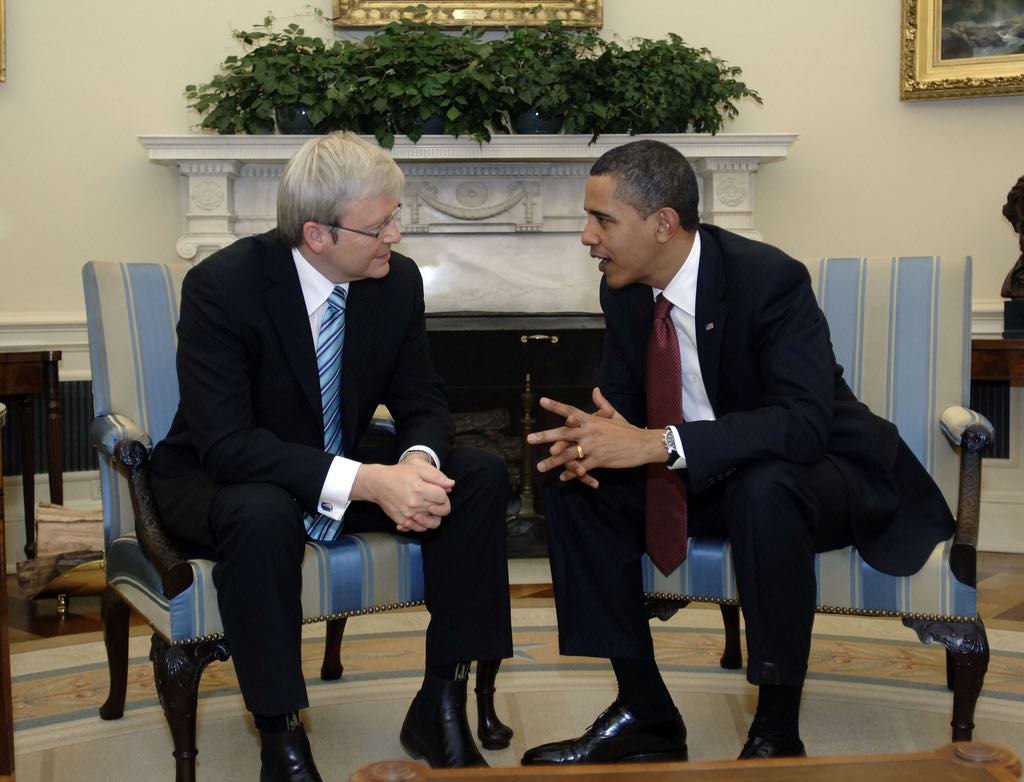
There is much in it that has already been covered by the mainstream media, with emphasis on the bitter accounts of his disastrous relationship with Julia Gillard.
But there is also much in it which covers important issues of our time, many of them still the big issues of the day – such as climate change, economic management, the complexities of Australia’s relationships with the rest of the world, especially with the United States and China.
What has so far received little attention – but is deserving of more – is a spirited and comprehensive defence of the cause of multilateralism.
Rudd’s reputation in domestic politics was that of a bit of a loner, a politician who spurned the idea of factions and alliance – personal traits which ultimately cost him his prime ministership because when attackers came after him he lacked an adequate support base to fend them off.
But in international affairs, Rudd is a passionate globalist. And he argues with some force that multilateralism and the shared sovereignty that is required by nations following an internationally agreed set of rules continues to offer the best chance of maintaining global security, prosperity, and peace.
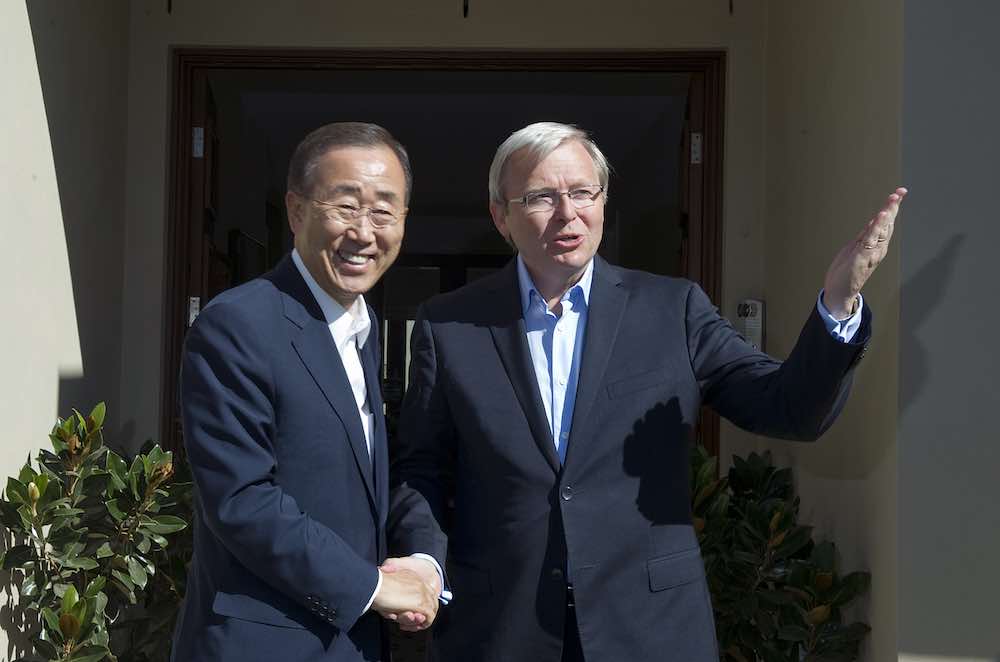
Given that the revolt against multilateralism and the rules-based global order is now being led by populists and nationalists – with the president of the United States leading the charge – Rudd’s entreaty to the world to stop and think before this runs completely out of control is worth noting. If anyone was looking for a script for the defence of multilateralism, Rudd provides it in this book.
The whole point of the post-war international order, Rudd argues, after the wholesale barbarism of the Second World War was to create a framework of laws, rules, and norms that would govern the international behaviour of states for the future rather than simply return to the ancient principles of the survival of the fittest.
Multilateralism, Rudd argues, is the best means available of overcoming the historic reality that smaller and middle-sized countries always came out worst when they could only rely on the law of the jungle.
“That is why a rules-based system is of deep benefit to countries like Australia,” Rudd writes.
Unlike the great powers, Australia does not necessarily have the independent capacity to secure the territorial integrity, national sovereignty, or other fundamental national interests of our vast continent in an increasingly chaotic region and world.
Indeed, the whole point of the international rules-based order was to defend the interests of the weak against the strong, to avoid the recurring calamity of war, and to protect all peoples from the hazards of extreme poverty, natural disasters, and global environmental calamity.
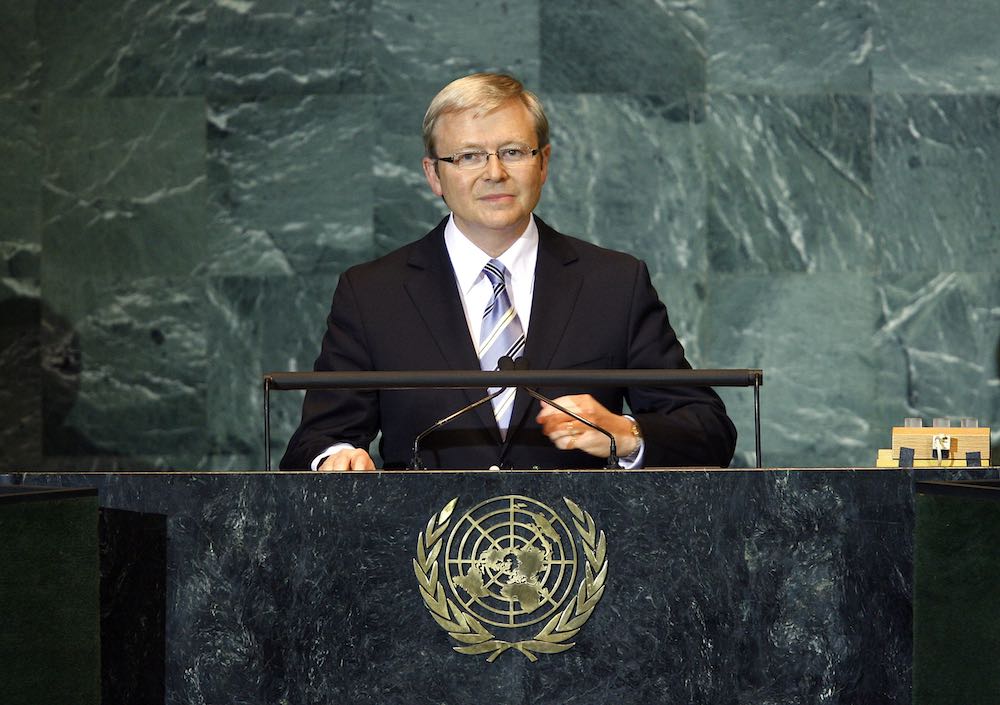
He said that in addition to the US alliance and comprehensive engagement with Asia, support for and advocacy of the international rules-based system – anchored in the UN, the International Monetary Fund, the World Bank, the World Trade Organisation and the general fabric of international law – was one of the three pillars of his government’s international engagement.
Australia’s national security was served by the international legal framework against wars of aggression. Moreover, as a globalising economy, Australia had an interest in the international rules of trade, investment, and intellectual property rights.
In other words, Australia’s underlying national values and interest were enhanced, not undermined by maintaining the long-term integrity of the UN rules-based system. Rudd writes:
It has always staggered me that the conservatives in Australia saw this particular pillar of our national security as an opportunity to play mindless, juvenile, partisan games about the relevance of the UN to our enduring national interests – not to mention the importance of the UN as a continuing international expression of our underlying national values in support of a more decent, compassionate, and peaceful world.
The conservative critique of the UN and anyone who happened to support the UN ran along the following lines: first, that it cost too much money and wasted the money it was given; second, its membership included a whole bunch of third world dictators and therefore was not properly representative of the international community; and third, the UN tried to tell Australia what to do on matters such as climate change, asylum seekers, and Iraq.
Then there was the old faithful – the argument always favoured by the conservative commentariat which is ‘why are we supporting the UN when we have so many more pressing needs closer to home, not to mention in Australia itself?’.
But what the conservatives loved most of all was ripping into any aid commitments to Africa. This had the added advantage of tapping neatly into the latent racist sentiment that still lurked in the uglier recesses of the Australian conservatives’ political heartland.
The whole problem was that, as a matter of fact and logic, each of the arguments they mounted in their attack on the US was complete bullshit. The entire conservative critique deployed against the UN is intellectually fraudulent from beginning to end.
The facts in simply financial terms, as Rudd sees them, are irrefutable. The entire UN budget was less than 10% of the US defence budget. Australia contributed less than less than 3% of total global contributions to the UN and, as its 11th largest donor, was making a contribution that commensurates with being the 12th largest economy. This represented just 0.4% of the total federal budget.
Yet tens of billions more than Australia’s contribution was redirected by the UN, through its agencies, to our immediate region in support of poverty alleviation programs in the South West Pacific, Southeast, and East Asia. As Rudd puts it:
In other worlds, given that practically all our neighbours are developing countries, the UN in fact represents a great deal for Australia. It spreads the burden in our own region across the wider international community.
And then there is the hoariest old chestnut of all – why should we support the UN when there were so many other needs closer to home?
While seeking to appease underlying xenophobia in parts of the country this approach ignores the fact that most Australians have a deeply internationalist instinct. On a per capita basis, the Australian public are among the most generous people in the world in the private contributions to international charities in their response to global humanitarian disasters … Being a good international citizen through our support for the various arms of the UN system was a natural extension of these pervading Australian values, most particularly our belief in ‘a fair go for all’.
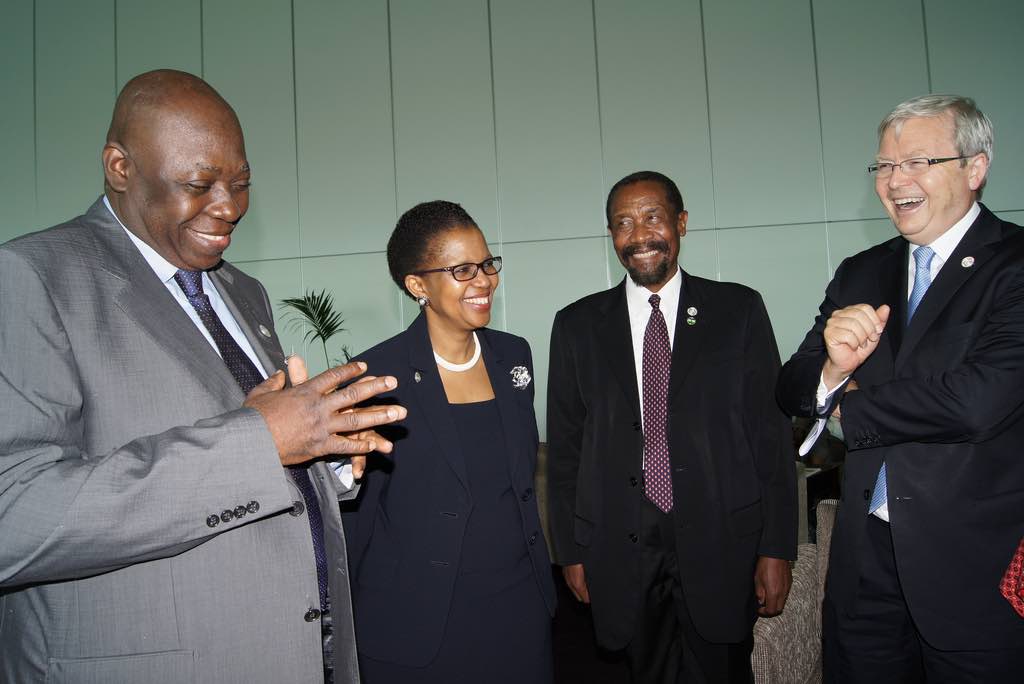
Rudd describes his government’s record on foreign aid as one of the achievements of which he was most proud. Achieving a level of foreign aid of 0.45% of Gross National Income (GNI) had been a significant step towards the UN Millennium Development Goals of 0.7% of GNI – and this was after the Howard government had reduced the aid budget to 0.25% of GNI.
But, he said, it had been made very clear to him by then opposition leader Tony Abbott at a function in Parliament House that the aid budget was to be a prime target for a conservative government.
Although Abbott had publicly committed to the 0.7% Millennium Goal, he had said to Rudd: “Kevin, you have got to agree, this level of aid is just bullshit”.
“I begged to differ,” Rudd writes.
As I became Foreign Minister [after he lost the leadership to Julia Gillard] I was about to preside of the biggest expansion of the aid budget in history. It was an absolute national tragedy when the conservatives proceeded to abolish AusAID altogether and integrate it into DFAT and then went about slashing the aid budget by almost $2 billion annually and reducing it by more than a third, this after promising to preserve the agency and the budget – both bald-faced lies.
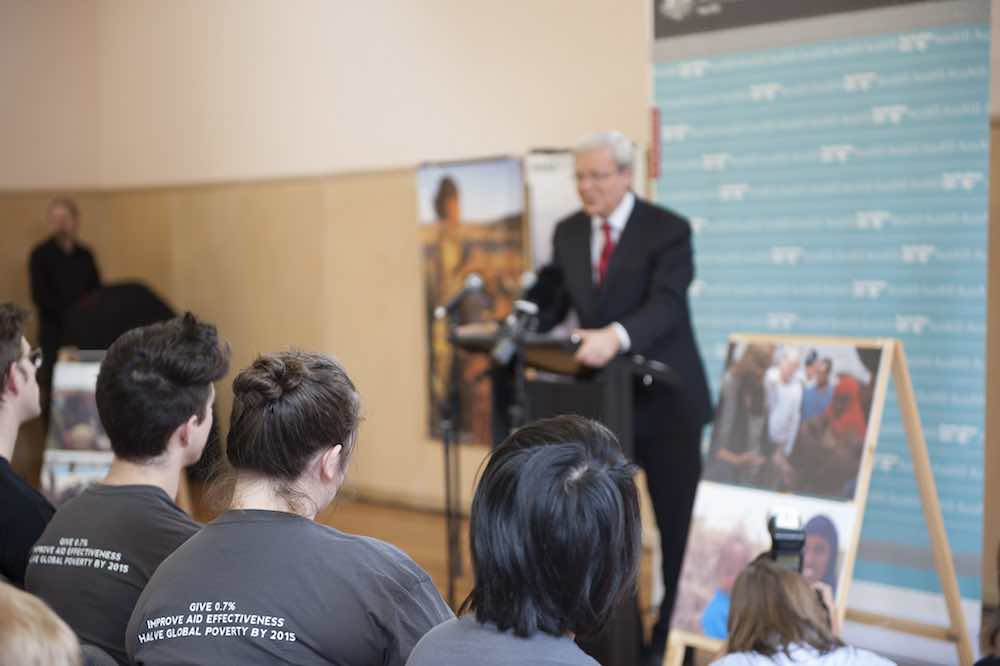
Rudd writes that – consistent with Australia’s powerful interest in the proper functioning of the multilateral system – he regarded two other achievements of his government as having been major steps forward.
These were Australia’s success in winning a seat on the UN Security Council and the hard-won agreement of the major powers to make the Group of Twenty (G20) the premium forum for global leadership dialogue.
There are other threads relating to foreign, defence, and security issues running through the Rudd book, including a strong defence of his government’s 2009 Defence White Paper, which rang alarm bells about the rising assertiveness of China and the security challenges this could pose for Australia.
Rudd argues that the subsequent Gillard government’s 2013 White Paper and Gillard’s Australia in the Asian Century White Paper – which softened significantly the language relating to the China threat – had adopted a “Pollyanna, don’t worry, be happy and everything will be alright in the morning” approach to the China question.
Rudd said that this had been a political decision taken by the Gillard government to justify walking away from the 2009 White Paper long-term commitment to raise defence spending to 2% of GDP.
Rudd asserts that this retreat “was not lost on Washington”.
“In 2012-13 the Obama administration registered official complaints with Canberra over the change in strategic guidance and the reduction in the Australian defence budget. These were never made public,” Rudd writes.
